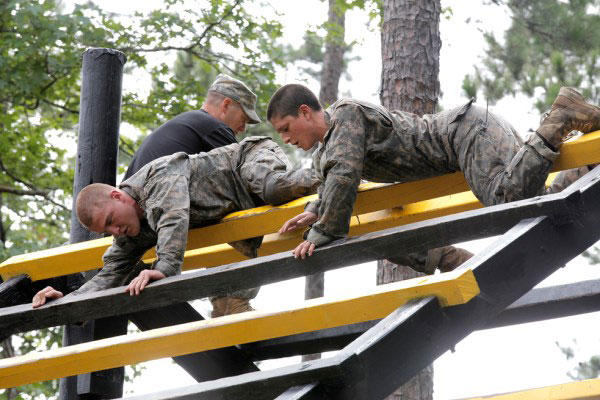A new survey of female military veterans and service members shows most perceive the public doesn't recognize or value their service the way it does their male counterparts, and their contribution isn't adequately portrayed in the news and entertainment media.
The survey, conducted by the advocacy group Service Women's Action Network, includes nearly 1,000 service women and veterans from 49 states representing all states, with both officers and enlisted troops represented.
Nearly three-quarters of respondents, 74 percent, said they believe their service isn't publicly recognized. They said they most wanted the public to know more about their leadership and contributions, their stories and experience, and the challenges they face. About two-thirds, or 68 percent, of respondents said the military was responsible for building this awareness, while more than half, or 57 percent, said they wanted veteran service organizations to tell their story.
Among other dramatic findings was that 71 percent of those surveyed didn't belong to a veteran service organization, a possible symptom of a perceived disconnect between the male-focused community they offer and the needs of female veterans. One-third of survey respondents said that they actually didn't feel welcome in existing veteran service organizations, and more than half, 51 percent, said they hadn't been informed about membership opportunities for these organizations.
But nearly all of those surveyed, or 97 percent, said they would welcome the opportunity to participate in an organization focused specifically on the issues facing female troops and women veterans.
The survey also highlighted a broad perception among women who have served that the media and pop culture often got their story wrong.
Two-thirds of respondents, or 68 percent, said media outlets fail to include women in uniform when reporting on war or veterans' issues. Almost the same percentage, or 66 percent, said they don't believe media coverage of service women and women veterans is accurate and balanced. In entertainment, a dramatic 82 percent of service women and female veterans don't believe their depiction in TV and film is accurate and balanced, and 78 percent said the entertainment industry fails to include them when depicting scenes of war or life as a veteran.
Women still in uniform listed gender bias as a top challenge, both in personal life and community. Job and assignment opportunities presented another top personal challenge, they said, while sexual harassment and assault was among the top three community challenges they listed.
Veteran respondents said mental health and the difficulty of connecting to a community of other female veterans were among their top personal concerns.
This is the first national-scale survey for SWAN focused on identifying challenges facing women who served, the organization's chief executive officer, Judy Patterson said in a statement.
"This data is hugely helpful to SWAN as we set our programmatic and policy agendas in 2017, but it also has significant value to the broader community, as we lack nuanced insights into rapidly growing community of military women," she said. "SWAN will be sharing the full data from this survey with a number of other veterans groups, and will be tailoring our efforts moving forward to ensure that the voices of all of these women are heard and heeded."
The organization planned to host an event Monday to discuss the survey's findings.
-- Hope Hodge Seck can be reached at hope.seck@military.com. Follow her on Twitter at @HopeSeck.



























